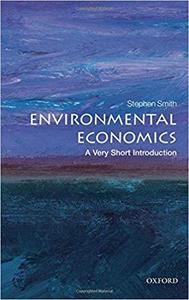An Introduction To Environmental Economics
Published 4/2024
MP4 | Video: h264, 1920x1080 | Audio: AAC, 44.1 KHz
Language: English
| Size: 1.30 GB
| Duration: 2h 31m
Environmental Economics
What you'll learn
Externalities both positive and negative
Pigouvian taxes and subsidy
Coase theorem
Carbon tax and Cap and Trade
Requirements
Interest in environmental issues
Description
This is an introductory course.Anybody with interest in environment can understand the concepts covered in this courseIt is the course which exposes the student to core concepts of environmental economicsThe focus is practical The focus is on case studies and using the case studies to teach the core concepts The student would be able to apply the concepts to many environmental problems like water pollution, air pollution and climate change What is environmental economics ?Environmental economics studies the impact of environmental policies and devises solutions to problems resulting from them.Environmental economics can either be prescriptive-based or incentive-based.A major subject of environmental economics is externalities, the additional costs of doing business that are not paid by the business or its consumers.Another major subject of environmental economics is placing a value on public goods, such as clean air, and calculating the costs of losing those goods.Since some environmental goods are not limited to a single country, environmental economics often requires a transnational approach.What environmental economists do ?Broadly speaking, environmental economics may produce two types of policies

rescriptive RegulationsIn a prescriptive approach, the government dictates specific measures to reduce environmental harm. For example, they may prohibit highly-polluting industries, or require certain emissions-controlling technologies.Market-based RegulationsMarket-based policies use economic incentives to encourage desired behaviors. For example, cap-and-trade regulations do not prohibit companies from pollution, but they place a financial burden on those who do. These incentives reward companies for reducing their emissions, without dictating the method they use to do so
Overview
Section 1: Introduction
Lecture 1 About this course
Lecture 2 Introduction
Lecture 3 Externalities
Lecture 4 Environment and Economics
Lecture 5 Externalities explained
Lecture 6 Externalities and marginal social costs
Lecture 7 Positive externalities few examples
Lecture 8 Negative externalities few examples
Lecture 9 Marginal social costs
Lecture 10 Marginal social benefit
Lecture 11 Externalities and market equilibrium
Lecture 12 Externalities and market failure
Lecture 13 Pigouvian taxes and subsidies
Lecture 14 Pigouvian approach of taxation for market correction
Lecture 15 Pigouvian taxes examples
Lecture 16 Carbon tax Pigouvian tax
Lecture 17 Carbon tax calculations
Lecture 18 Coase theorem statement
Lecture 19 Coase theorem explained
Lecture 20 Coase theorem limitation
Lecture 21 Cap and trade
Anyone concerned about environmental issues
Free search engine download: An introduction to Environmental Economics








